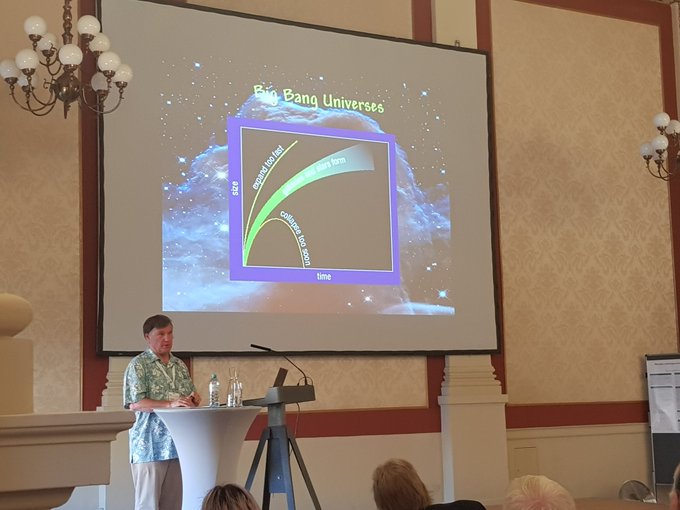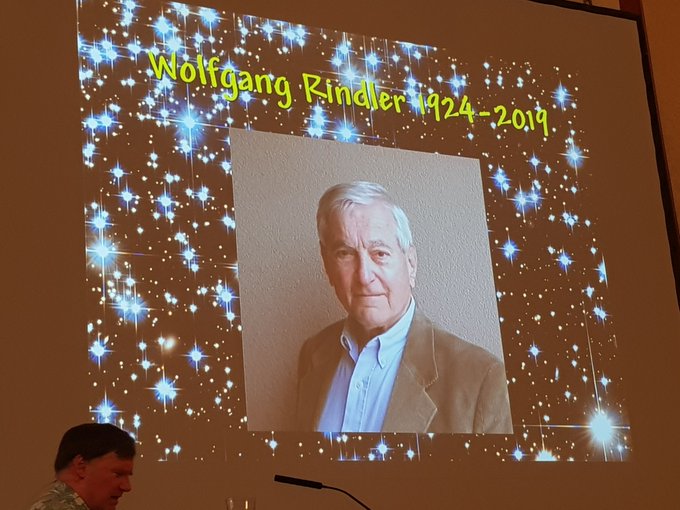John D. Barrow: 100 Years of Universes (In Memoriam Wolfgang Rindler)
“Philosophers were talking about that in the past, now we even have the mathematics to show it.”
“In the Multiverse model now we actually accept that other universes do not need to be governed by the same laws as our universe.”
Wolfgang Rindler in Memoriam Public Lecture on July 26, 2019, given by John D. Barrow was open for the general public and part of the international conference “Kurt Gödel’s Legacy. Does the Future lie in the Past?” organized by Kurt Gödel Society.
John D. Barrow – 100 Years of Universes
Every solution of Einstein’s equation is an entire universe. They offer a novel solution to some deep puzzles about the structure of the astronomical universe. Prof. Barrow will in this lecture embark on a travel which will lead us through the islands of some of the pertinent questions of modern physics, cosmology, and mathematics. He will tell the story of all the different possible universes that were found to be solutions of Einstein’s equations: static and expanding universes, contracting universe, oscillating universes, accelerating universes, chaotic and distorted universes — all make their appearance together with the unexpected spinning, universe with time-travellers found first by Kurt Gödel. He will converge on best description of our visible universe today and the contemporary inflationary universes. They offer a novel solution to some deep puzzles about the structure of the astronomical universe. Will we ever discover a single scientific theory that tells us everything that has happened, and everything that will happen, on every level in the Universe? What might such a theory look like? What would it mean? And how close are we to getting there?
This lecture is in memory of Wolfgang Rindler, an Austrian physicist specializing in relativity and its effects on cosmology, who died in February 2019. Key ideas introduced by Wolfgang Rindler play a pivotal role in our understanding of how the present structure of the universe came to be, and they determine what its extraordinary fate appears to be in the far distant future.
About Prof. Barrow
Professor John D. Barrow has been a Professor of Mathematical Sciences, Geometry and Astronomy (!) at the University of Cambridge since 1999, carrying out research in mathematical physics, with special interest in cosmology, gravitation, particle physics and associated applied mathematics. His principal research interests are in cosmology – the study of the past, present (and even likely future) structure of the Universe. Although he has observed on large telescopes occasionally in the past, he is a theorist, and the data that he is most interested is taken by satellites and telescopes like the Hubble, Keck and AAT instruments. At present, he has a particular interest in using astronomy to learn things about fundamental physics more accurately that can be done with laboratory or accelerator experiments, especially whether the ‘constants’ of physics might have very slow variations at the level of parts in a million over ten billion years. Like many cosmologists, he is also interested in studying varieties of the inflation phenomenon in its early stages and providing a natural explanation for why the universal expansion started to accelerate a few billion years ago. He also studies the mathematics of solutions of Einstein’s equations that describe anisotropic and non-uniform cosmological models, the possibility of singularities arising at a finite time in the cosmological evolution of simple forms of matter and the appearance of chaos near the apparent beginning of the universe’s expansion.
He is the author of over 420 articles and 19 books, translated in 28 languages, exploring the wider historical, philosophical and cultural ramifications of developments in mathematics, physics and astronomy. He has also delivered lectures in a perhaps unique combination of locations including 10 Downing Street, Windsor Castle, the Vatican Palace and the Venice Film festival.
Since its inception in 1999 John Barrow has been the director of the Millennium Mathematics Project which aims to improve the understanding and appreciation of mathematics and its applications amongst young people and the general public.
Kurt Gödel’s Legacy. Does the Future lie in the Past?
Two events that have had a strong influence on the world of science are celebrating an anniversary this year: the decisive review of Albert Einstein’s theory of relativity is 100 years old. Furthermore, 70 years ago Kurt Gödel proved that theory of relativity is compatible with closed time lines. This Gödel’s rotating universe shows how time travel is at least mathematically imaginable. For this reason, the Kurt Gödel Society is organizing the international conference “Kurt Gödel´s Legacy: Does Future Lie in The Past?” at the University of Vienna from July 25 to 27, 2019.
The conference is supported by the University of Vienna, the Austrian Academy of Sciences, the research platform TURIS, the Vienna Center for Logic and Algorithms at the TU Vienna, the Department Vienna Circle and the Vienna Circle Society.


